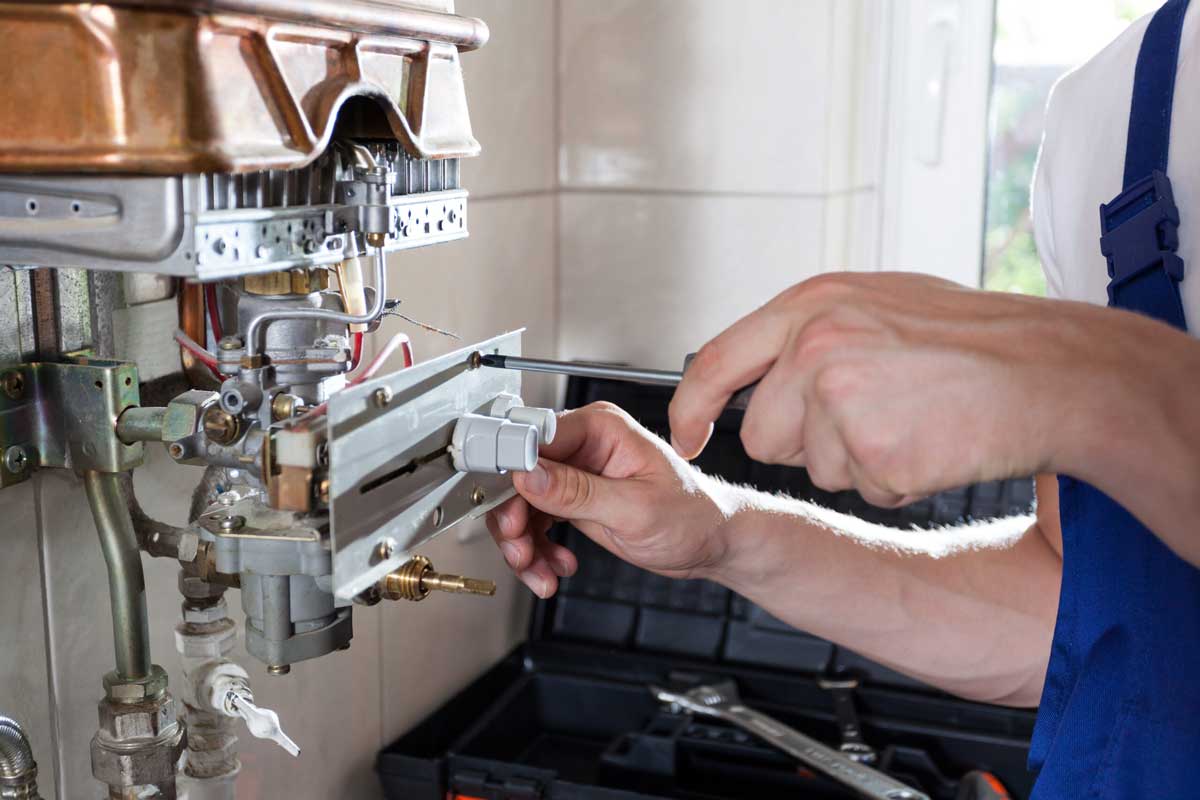When you think about your water heater, you imagine hot showers and sparkling-clean dishes. We use our water heaters in our daily routines, from getting ready in the morning to cleaning the dinnerware at night. However, we seldom stop to consider the possibility of a leak.
A leaking water heater can be incredibly inconvenient, but it can also lead to unwanted water damage. Below, we’ll go over what causes a water heater to leak and how to prevent a leak from occurring.
5 COMMON CAUSES OF WATER HEATER LEAKS
Unfortunately, a water heater leak can occur for countless reasons. As a result, you may need to inspect your tank to identify the exact reason for the leak. So, what causes a water heater to leak?
Here are common problems that can lead to a leaky electric or gas water heater tank:
1. AGING UNIT
Old age can get the best of any household appliance or system—including your water heater. Most water heaters can last up to ten years before starting to malfunction. However, older units around 15 years old can be more prone to leaks.
Over long periods, your water heater can start to accumulate rust, which can corrode your tank and lead to cracks. As a result, leaks can appear.
2. INLET & OUTLET CONNECTIONS
You’ll find two pipes connected to the top of your tank: a cold water inlet and a hot water outlet. These connections allow the fixtures across your home to receive hot water. Since your water connections see a lot of use, they can potentially loosen and detach after some time.
If you have a loosened connection, you can use a pipe wrench to tighten it. However, before attempting any repairs, remember to turn off the power to your water heater. You’ll also need to close the water heater shut-off valve and close off the water supply.
3. FAULTY T&P VALVE
If you have a water heater leak, it’s also possible that the temperature and pressure relief valve is to blame. The T&P valve is a safety device that releases a minor stream of water when pressure builds to an unsafe level within the tank.
This valve can leak if it gets stuck in a half-open, half-closed position. Additionally, excessive pressure can cause the valve to malfunction. If you encounter a leaking T&P valve, it’s a good idea to contact a professional to perform a repair.
4. SEDIMENT BUILDUP
If you want to know what causes a water heater to leak, turn next to a homeowner’s nightmare: sediment buildup. Not only can sediment buildup lead to insufficient hot water and low water pressure, but it can also result in unexpected leaks. When sediment collects in your water heater tank, cracks can form. As such, it’s crucial to schedule regular water heater maintenance to clean the tank and flush out sediment.
5. LOOSE DRAIN VALVE
Your water heater’s drain valve is used to empty and “flush” the tank, often during maintenance services. Like the T&P valve, this specific valve can loosen over time, resulting in leaks.
If you notice a leak at the base of the drain valve, you’ll need to replace the valve. To check if this is the cause of your water heater leak, ensure that the valve is fully closed.
TROUBLESHOOTING YOUR LEAK
It’s not always easy to determine the cause of a leak. Now that we’ve reviewed what causes water heaters to leak, let’s go over how to identify your water heater’s problem according to the location of the leak. Commonly, leaks are found at the top or bottom of the tank. However, some leaks can also be internal.
LEAKING FROM THE TOP
If your water heater is leaking from the top, you’re most likely facing a problem with the T&P valve or the inlet and outlet connections. Most of the issues with these parts can be easily fixed with professional water heater repair services. If you require water heater repairs in Peabody MA, turn to the experts at Spencer Home Services.
LEAKING FROM THE BOTTOM
Leaks from the bottom of your water heater tank may indicate a problem with the drain valve. Fortunately, the drain valve can be repaired or replaced. However, a bottom tank leak may also mean that the entire water heater tank requires a replacement.
LEAKING INSIDE THE TANK
Internal water heater tank leaks are often the result of aging and corrosion. When this happens, it’s time to replace your water heater.
HOW TO AVOID A WATER HEATER LEAK
If you currently have a leaking unit, avoid another leak from happening with these tips:
- Inspect Your Water Heater: Watch for loose parts and potential cracks. The sooner you notice them, the quicker you can fix them.
- Fix Loosened Parts: Tighten loose parts, such as inlet and outlet connections, when necessary. Remember to take the proper safety precautions.
- Schedule Routine Maintenance: Regular tune-ups will help keep your water heater tank in peak condition (and sediment-free).
CALL AN EXPERT
Sometimes, maintenance and repairs aren’t enough to fix your tank. If you have a water heater leak and it’s time to replace the entire water heater, call a plumber you can trust to get the job done right. We’re proud to install gas or electric water heaters according to our customers’ needs.
Contact us today to schedule a hot water heater replacement in Peabody, MA!


